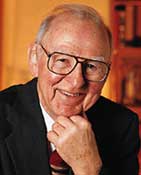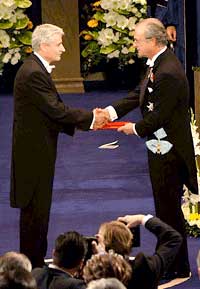 |
|||||||||
|
Research Feature Stories: Other News: |
Discovery of Protein Phosphorylation Has Had Broad Influence
When UW professors Dr. Edmond Fischer and Dr. Edwin Krebs received the Nobel Prize for Medicine in 1992, they were recognized for the discovery of protein phosphorylation, a vital mechanism of cell regulation underlying the actions of many hormones and drugs. This finding has influenced the work of laboratories around the world. For example, the Nobel Prize in 2000 was awarded for brain mechanism studies that were based in part on the protein phosphorylation process that Krebs and Fischer had identified.
Their finding has been likened to flipping a switch that lights a light or engages a machine. They found that a chemical reaction called protein phosphorylation is the switch that turns on the biological engine, thereby activating cells to meet the energy requirements for performing a specific task. Krebs and Fischer discovered that enzymes called protein kinase and protein phosphatase are the switches that turn on and off a variety of biological functions inside the cell. These functions include fat breakdown and chemical energy generation. An estimated 1,000 research papers are published each year based on their discovery.
 |
 |
 |
|
|
1992 Nobel Laureates Dr. Edmond Fischer (left) and Dr. Edwin Krebs (right) were recognized for their discoveries concerning reversible protein phosphorylation as a biological regulatory mechanism. The press release issued by the Nobel Assembly at the Karolinska Institute stated that the award was in recognition that "Their fundamental finding initiated a research area which today is one of the most active and wide-ranging." |
1990 Nobel Laureate Dr. E. Donnall Thomas. Thomas, shared the honor with Joseph E. Murray for their discoveries concerning "organ and cell transplantation in the treatment of human disease." |
||
Investigators have used the discovery to uncover the cause of McArdle syndrome, a metabolic disorder of glycogen storage. The discovery, made in the early 1950s, also proved important in later studies of diabetes and other endocrine disorders of carbohydrate metabolism. The influence of this discovery extends to many levels of medical research. Understanding how normal and abnormal cellular activities are controlled may provide clues to the underlying causes of cancer, heart disease, learning and memory disorders, and other diseases as well.
Dr. William Catterall, professor and chair of pharmacology at UW, said the widespread importance of this work cannot be overemphasized and added, “There is no more important discovery in cell biology in our time.”
As is the case with many scientific breakthroughs, Fischer and Krebs made their prize-winning discovery by chance while seeking the solution to another problem—the metabolism of glycogen, a carbohydrate stored in the body and changed to sugar when the body needs energy. Both men stressed the importance of continued funding for basic research rather than targeting a specific disease for research funding.
“One of the exciting things about basic research,” said Krebs, “is you never know what particular aspect of biology a given discovery may impinge on. It’s often a mistake to set out with a restricted mission to solve one specific problem.”
Krebs’ and Fischer’s selection for the 1992 Nobel Prize in Medicine or Physiology doubled the number of Nobel Laureates at the UW. Two other UW researchers had received the Nobel Prize prior to 1992: physicist Dr. Hans Dehmelt in 1989 for ion capture, and UW medicine professor Dr. E. Donnall Thomas of the Fred Hutchinson Cancer Research Center for bone marrow transplantation.
 |
Swedish King Carl XVI Gustaf presented the 2001 Nobel Prize in Medicine and Physiology to Lee Hartwell, director of the Fred Hutchinson Cancer Center and UW professor of genome sciences, in December 2001. Hartwell was jointly awarded the Nobel Prize with R. Timothy Hunt and Paul M. Nurse for their discoveries of key regulators of the cell cycle. The Nobel Assembly specifically recognized Hartwell for work on "a specific class of genes that control the cell cycle. One of these genes called 'start' was found to have a central role in controlling the first step of each cell cycle. Hartwell also introduced the concept 'checkpoint', a valuable aid to understanding the cell cycle." |
As this issue of the Dean’s Report went to press, Dr. Leland Hartwell was notified that he would share the 2001 Nobel Prize in Physiology or Medicine for discoveries of key regulators of the cell cycle. Hartwell directs the Fred Hutchinson Cancer Research Center, and is a UW professor of genome sciences and adjunct professor of medicine.
|
| UW AMC Medical Center | UW School of Medicine | Harborview | UW MC | Search UW AMC | UW Home | Contact Us | ©2001-2002, University of Washington Academic Medical Center. All rights reserved. Please honor our copyrights. |
|